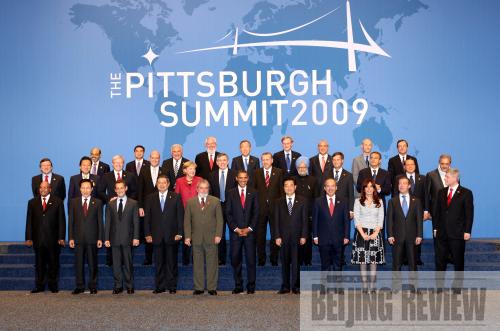|
 |
|
A SUMMIT ASCENT: G20 leaders pose at their third summit in Pittsburgh, the United States, on September 25 |
Pittsburgh has a history of battling recession. The collapse of the steel industry in the 1970s brought Pittsburgh's economy down with it. Since then, however, Pennsylvania's second biggest city has rebounded with help from sectors including health care, education, technology and financial services.
In fact, the city of 300,000 people now ranks among the most livable in America.
And on September 24 and 25, when leaders of the world's 20 largest economies convened there, they only heard about Pittsburgh's success story—but, more importantly, tried to come up with a similar roadmap for global economic recovery and sustainable growth.
This was the third meeting for the leaders of the Group of 20 (G20) nations, which represent 85 percent of the global economy's output, in the past year.
The first G20 leaders' gathering to deal with the world financial crisis took place in Washington, D.C. last November. The Washington summit was a success in that it achieved a general agreement on the root causes of the crisis as well as cooperation in strengthening economic growth.
Against the backdrop of the fast-spreading economic deterioration, the London summit that followed in April this year reached an agreement calling for the reform of the international banking system. It also called for the injection of $1.1 trillion to various programs designed to tackle the economic downturn and promote recovery.
In Pittsburgh, the United States presented its guests a backdrop of a place that has emerged from the depths of a severe economic slump to a vibrant economy. Amid this calm atmosphere these leaders reviewed the recovery progress made since the London summit and discussed ways to move forward.
It is important for leaders of major economies to discuss global development at a period punctuated by slow growth, Steven Dunaway, an adjunct senior fellow for international economics at the U.S. Council on Foreign Relations told Beijing Review.
The third G20 summit was needed, as "the process of recovery and repair remains incomplete," said the 23-page Leaders' Statement issued at the meeting's end.
"We cannot rest until the global economy is restored to full health," said the statement, "and hard-working families the world over can find decent jobs."
Imbalance
Addressing global imbalances would be a priority at the G20 summit, stressed U.S. President Barack Obama before he arrived in Pittsburgh.
"We can't go back to the era where the Chinese or the Germans or other countries just are selling everything to us," said Obama during an interview with CNN on September 20.
Rebalancing the Chinese economy has been the subject of debate for a long period of time, said Dunaway. Early in the aftermath of the financial crisis last year, some economists and officials, including former U.S. Treasury Secretary Henry Paulson, said economic imbalances were largely to blame for the global crisis.
Moreover, they said, these ranged from high savings and massive trade surpluses in countries like China, to high consumption and trade deficits in countries like the United States.
"This is the reality of imbalance, but it's not the main reason that led up to the financial crisis," said Ma Xin, Director General of the International Cooperation Department at China's National Development and Reform Commission, at a news briefing held by the Chinese delegation to the G20 summit on the sidelines of the summit.
Ma said there are other imbalances in the world, like the imbalance of wealth distribution, imbalance of development and imbalance of international payments.
He added that China's low rate of consumption is a structural problem that has accumulated over many years. Moreover, he said the nation is aware of the problem and has spared no effort in expanding domestic demand and stimulating consumption.
China announced a massive $586 billion stimulus package last November to boost domestic demand in the face of slumping exports.
With large amounts of money spent on upgrading infrastructure, increasing rural incomes, promoting social welfare programs and combating environmental issues, China achieved a 7.1-percent gross domestic product growth in the first half of 2009 from the same period a year ago. This came despite the fact that its exports fell for the 10th consecutive month in August.
Chinese President Hu Jintao said at the Pittsburgh summit that China has attached great importance to "comprehensive, balanced and sustainable social and economic growth" and has mainly relied on "expanding domestic demand" in mitigating the impact of the crisis.
To balance its economy, Beijing should remove price distortions, allow more flexibility in exchange rates and improve social services, Dunaway told Beijing Review.
Even so, it will take time for China to establish social security systems for the protection of health care and retirement that will reduce incentives for "precautionary" savings, Nicholas Lardy, a China economy specialist at the Peterson Institute for International Economics in Washington told Bloomberg News.
The G20 countries agreed to increase the quota share to dynamic emerging markets and developing countries at the International Monetary Fund by at least 5 percent and the voting power for developing and transition countries at the World Bank by at least 3 percent to enhance their representation, according to the Leaders' Statement.
They also committed to developing internationally agreed rules by the end of 2010 to improve both the quantity and quality of bank capital and putting them into practice by end-2012.
At the same time, they ruled out short-term exit strategies, promising to maintain their measures to support economic activity until recovery is fully assured.
Protectionism
Despite repeated vows by world leaders at the G20 Washington summit last November and again in London in April to resist protectionism, trade tensions spurred by imbalances appear on the rise.
| 